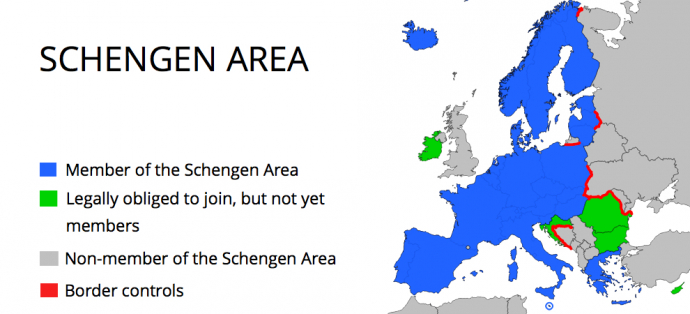Travelling To Germany Post-Brexit: Do You Need A Schengen Visa ?
Last Updated on
This is a sponsored post in collaboration with AXA.
My first trip of 2020 was to Germany, and back to my old haunt of Munich.
I love Germany. The different beer, the food, the mountains, and their pragmatic, efficient approach to everything.
My trip to Germany came to an end 2 days before the 31st January 2020, the official date of when the UK left the European Union.
When I came back, it got me thinking…if I travel to Germany again this year, and even in 2021 and beyond when the transition period is over, how will it affect my travel to Germany?
Whilst a few things are still up in the air at the time of writing this post, there are a few things to be aware of.
SCHENGEN AREA
The Schengen area is a block of 26 (currently) European countries. It allows for passport-free movement across those 26 countries, and was initially started by Belgium, France, Germany, Luxembourg and the Netherlands in 1995. The UK has never been part of the Schengen area, which is why anyone from the UK always needs their passport to travel to Germany or any other of the European countries shown below.

The Schengen agreement is often criticised by Eurosceptics who say it is an open door for migrants and criminals to travel across Europe. The UK opted out of the Schengen Agreement for that very reason – to have better control over its borders.
POST-BREXIT TRAVEL
So how does post-Brexit travel to Germany and the other EU countries affect my passport, and do I need a visa? Well, let me split that answer into two sections: the Transition Period and Travel To Europe In 2021.
Transition Period
When the UK left the European Union on 31st January 2020, we entered a transition period of 11-months, which gives the UK government time to sort out trade agreements, movement of people, immigration and many other things with the EU and non-EU countries.
Whilst the transition period is in place, travel continues as normal. Specifically:
- Flights, ferries, coach trips, trains & Eurostar services will all still run as normal
- You don’t need a visa to travel to the EU
- Valid passports can still be used & you do not need to have six months left on your passport
- Your European Health Insurance Card (EHIC) will still be valid throughout 2020
- A full UK driving licence is still fine to use to drive in the EU
- Data roaming in the EU is the same
Travel To Europe In 2021
When the transition period ends on 31st December 2020, travel to the EU, Switzerland, Norway, Iceland and Liechtenstein will change.
This is where things get a little vague, as nothing has been agreed yet, but it looks like the following will happen (this list will updated if and when things change, based on UK Government travel advice):
- Flights, ferries, coach trips, trains & Eurostar services will all still run as normal
- If you are a tourist on a short trip, the UK Government has said you will not need a visa to travel to the EU or the other countries mentioned above. But you may need a visa to work or study, or for business travel. As a slight twist, the European Commission has confirmed that while UK travellers will not need a visa, they will need to apply for and buy another document, called an ETIAS (European Travel Information and Authorisation System) and although not launched yet, is expected to come into force in 2021 and will cost 7 Euros every 3 years.
- Valid passports can still be used & but you will need to have six months left on your passport
- Your European Health Insurance Card (EHIC) will no longer be valid, and you’ll need to check your travel insurance for coverage
- As well as a full UK driving licence you may also need an international driving permit (IDP) to drive in some EU countries. If you’re taking your own vehicle, you might also need a ‘green card’ or valid proof of insurance and a GB sticker
- Free data roaming in the EU will end, and you will be charged
NON-UK TRAVEL TO THE EU
If you’re reading this from another country outside the UK, then things change again (sorry!).
Depending on where you are travelling from, you may need a Schengen Visa to visit one or more EU countries. Find out if you need a Schengen visa.
SUMMARY
A few things will change when we Britons travel to Germany and other EU countries from 2021 onwards.
But if you compare travel to the USA for example, the rules will be pretty similar. You need at least 6-months validity on your passport. You may need a visa (or certainly an ESTA). You may need an IDP. So by comparison, things would be pretty similar.
There are arguments that travel to the EU would be more frequent, but so long as the UK Government negotiates business and tourist travel correctly, all you would need is the ETIAS and a valid passport. Simple!
How do you think other changes may affect travel to the EU? Let me know in the comment below!
Disclosure – this is a Sponsored Post in collaboration with AXA. This blog post may contain links to the sponsor, but the content and opinions expressed are my own.




Travelling to EU after Brexit – Your top 5 questions answered!
https://www.qredible.co.uk/b/travelling-to-europe-after-brexit-your-top-5-questions-answered/
Very useful information on traveling to Germany. Like me, there are many who are confused about the Schengen visa. Your blog will help them to understand it clearly like it did for me.